Through its academic social network, labs and various initiatives, the Graduate Center supports collaborative digital scholarship.
The CUNY Academic Commons
The CUNY Digital Humanities Initiatives
JustPublics@365
CUNY Mapping Services
Digital Dissertations Resources
The Collaborative Seeing Studio
Commons in a Box
American Social History Project
New Media Lab
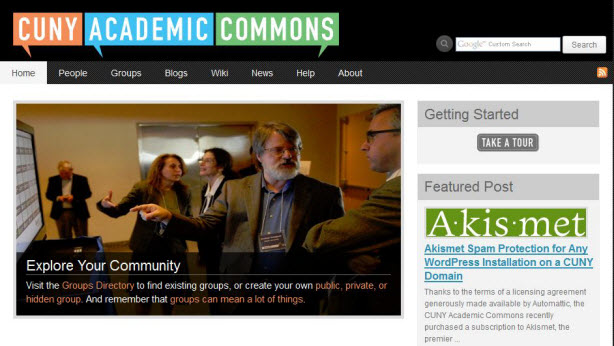 The CUNY Academic Commons is an online, academic social network for faculty, staff, and graduate students of the City University of New York (CUNY) system. Designed to foster conversation, collaboration, and connections among the 23 individual colleges that make up the university system, the site, founded in 2009, has quickly grown as a hub for the CUNY community, serving in the process to strengthen a growing group of digital scholars, teachers, and open-source projects at the university.
The CUNY Academic Commons is an online, academic social network for faculty, staff, and graduate students of the City University of New York (CUNY) system. Designed to foster conversation, collaboration, and connections among the 23 individual colleges that make up the university system, the site, founded in 2009, has quickly grown as a hub for the CUNY community, serving in the process to strengthen a growing group of digital scholars, teachers, and open-source projects at the university.
As stated in the site’s Terms of Service, members “seek to use the Academic Commons as a means of fulfilling our highest aspirations for integrating technology into our teaching, learning, and collaborating.”
CUNY Academic Commons is built entirely with open source software: WordPress with Multisite, BuddyPress and MediaWiki. It uses MYSQL as a database and runs under Linux. BuddyPress, a powerful WordPress plug-in which transforms a multi-user WordPress site into a social network, serves as the site’s hub. As one of its spokes, MediaWiki is seamlessly integrated into the site and lets users collaborate on projects and build knowledge bases. Users are allowed to create as many blogs and groups as they want.
 Begun in the Fall of 2010, the CUNY Digital Humanities Initiative “aims to build connections and community among those at CUNY who are applying digital technologies to scholarship and pedagogy in the humanities.” DHI is a public group on the CUNY Academic Commons, open to everyone, including “experienced practitioners and beginning DHers, enthusiasts and skeptics.”
Begun in the Fall of 2010, the CUNY Digital Humanities Initiative “aims to build connections and community among those at CUNY who are applying digital technologies to scholarship and pedagogy in the humanities.” DHI is a public group on the CUNY Academic Commons, open to everyone, including “experienced practitioners and beginning DHers, enthusiasts and skeptics.”
The group meets “on- and offline” to discuss important issues in DH and to share “work, questions, and concerns.” There are three key components of the CUNY Digital Humanities:
- The CUNY Digital Humanities blog – where members can contribute posts, find information on upcoming events and present the group’s work.
- The CUNY Digital Humanities Resource Guide, a collection of wiki pages containing annotated links to all things DH. The wiki can be edited by members of the Commons.
- The Forum, where members can start topics and generate lively discussion threads.
Since its inception, DHI has hosted many guest speakers, including Eben Moglen, Bethany Nowviskie, Ben Vershbow, Mark Sample, Shannon Mattern, Douglas Armato, Kathleen Fitzpatrick, David Hoover, Patrik Svensson, and Tom Scheinfeldt.
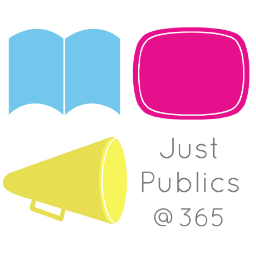 The goal of the Graduate Center’s JustPublics@365 program is to bring together academics, community leaders, policy advocates, journalists and digital activists in ways that create new forms of knowledge, connect across traditional silos, and foster transformation on issues of inequality and social justice.
The goal of the Graduate Center’s JustPublics@365 program is to bring together academics, community leaders, policy advocates, journalists and digital activists in ways that create new forms of knowledge, connect across traditional silos, and foster transformation on issues of inequality and social justice.
JustPublics@365 is a partnership between the Graduate Center of the City University of New York and the Ford Foundation. “We’re delighted that the Ford Foundation shares our long-term vision for bringing academic research to bear on pressing problems of social justice,” said Graduate Center Provost Chase F. Robinson. “JustPublics@365 is an ambitious effort to maximize the influence of faculty research through the innovative use of a wide range of social media, by creating partnerships among academics, activists and policy-makers, and by seeking new ways to measure impact.”
At the Graduate Center and beyond it, JustPublics@365 engages a dialogue among researchers on inequality, activists and media. It uses the networked landscape of the internet and the physical environs of the GC – JustPublics@365 is named for the institution’s address at 365 Fifth Avenue in Manhattan – to bring attention to those inequalities across several domains: economic, housing, race and ethnicity, immigration, health, and education.
“The pathway for scholars working on social justice research to engage the public via traditional and new forms of media will require collaborative models like JustPublics@365 now and into the future,” said Darren Walker, vice president of the Education, Creativity and Free Expression program at the Ford Foundation. “An informed citizenry is a prerequisite for democracy and embarking on creative experiments to connect the public to research on critical issues is a necessary priority.”
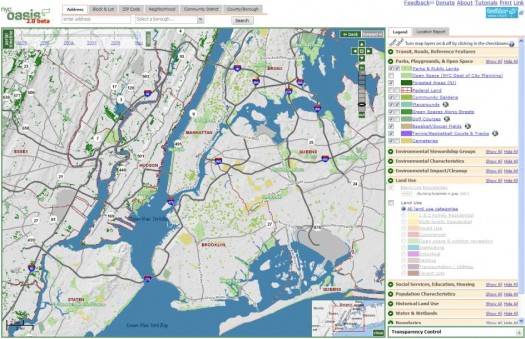 Part of the Center for Urban Research, the CUNY Mapping Service, directed by Steve Romalewski, “engages with foundations, government agencies, businesses, nonprofits, and other CUNY researchers to use spatial information and analysis techniques to develop and execute applied research projects.” Romalewski and his team of four build online applications that connect to powerful databases to create interactive maps.
Part of the Center for Urban Research, the CUNY Mapping Service, directed by Steve Romalewski, “engages with foundations, government agencies, businesses, nonprofits, and other CUNY researchers to use spatial information and analysis techniques to develop and execute applied research projects.” Romalewski and his team of four build online applications that connect to powerful databases to create interactive maps.
Some examples of CUNY Mapping Service’s work include:
- Visualizing Demographic Change: NYC and other major cities
- plus detailed analysis of race/ethnicity changes in New York neighborhoods
- the Census 2010 Hard to Count nationwide mapping site;
- the Long Island Index interactive map.
CUNY Mapping Service is also actively engaged in furthering OASIS NYC partnership which aims to provide “the richest source of community maps for New York City – free and all in one place online. OASIS is guided by a collaborative partnership of almost 60 greening groups, educators, individuals, businesses, nonprofits, and public agencies who use online mapping technology to help sustain the city’s open spaces and visualize the nexus between community greening and broader urban planning issues.”
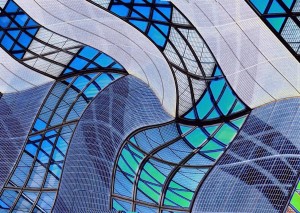 The GC Digital Fellows host a resource for students who are interested in creating a digital dissertation (and the committee members and academic departments who support them). The Digital Dissertations hub on the Digital Fellows website has sections for defining digital dissertations, evaluating them, and reflecting about the process of producing digital scholarship as part of the dissertation experience.
The GC Digital Fellows host a resource for students who are interested in creating a digital dissertation (and the committee members and academic departments who support them). The Digital Dissertations hub on the Digital Fellows website has sections for defining digital dissertations, evaluating them, and reflecting about the process of producing digital scholarship as part of the dissertation experience.
Visit the Digital Fellows blog to read more about this resource.
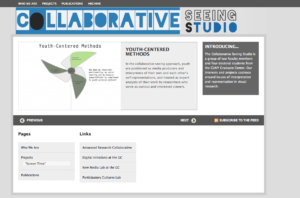 The Collaborative Seeing Studio is a group of two faculty members and four doctoral students from the Graduate Center, CUNY. Our interests and projects coalesce around issues of interpretation and representation in visual research. We came together in the Spring of 2011 around Wendy Luttrell’s longitudinal visual ethnographic project, Children Framing Childhood, and its follow up study, Looking Back. In a chapter in the recently published Handbook of Participatory Video, we described our process, which became the tenets of the Collaborative Seeing Studio.
The Collaborative Seeing Studio is a group of two faculty members and four doctoral students from the Graduate Center, CUNY. Our interests and projects coalesce around issues of interpretation and representation in visual research. We came together in the Spring of 2011 around Wendy Luttrell’s longitudinal visual ethnographic project, Children Framing Childhood, and its follow up study, Looking Back. In a chapter in the recently published Handbook of Participatory Video, we described our process, which became the tenets of the Collaborative Seeing Studio.
Through their use of photography and video, children and youth can bring to light preferred identities, aspirations, and passions, as well as hidden social realities that may be outside the view of adults in positions of authority. By positioning youth as media producers and interpreters of each other’s self representations in dialogue with researchers as curious and interested viewers and analysts, we advocate a need-to-know-more stance toward young people’s self and identity making through video. We understand this dialogic relationship between adult researchers and youth participants as fundamental to the practice of collaborative seeing — an approach to participatory video. (Luttrell, Restler & Fontaine, 2012).
Student members of the Collaborative Seeing Studio are now branching into their own individual projects, in which they seek to apply the tenets developed during our work in Looking Back.
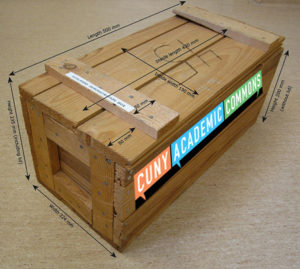 In November, 2011, the CUNY Academic Commons announced the formation of a new open source project called Commons in a Box that will “help other organizations quickly and easily install and customize their own Commons platform.” Funded by the Alfred P. Sloan Foundation, this initiative will create a proof-of-concept prototype for the Modern Language Association (MLA), “assembling new and existing WordPress-based community and collaboration tools into a single installation package.”
In November, 2011, the CUNY Academic Commons announced the formation of a new open source project called Commons in a Box that will “help other organizations quickly and easily install and customize their own Commons platform.” Funded by the Alfred P. Sloan Foundation, this initiative will create a proof-of-concept prototype for the Modern Language Association (MLA), “assembling new and existing WordPress-based community and collaboration tools into a single installation package.”
The CUNY Academic Commons team has consulted regularly with a range of institutions both within and outside of the CUNY system that have expressed interest in creating similar sites for their own communities. The core features of Commons-style networks enjoy broad appeal as institutions look for ways to penetrate institutional silos, to mitigate the effects of geographical distance, and to produce collaborative, public-facing scholarship that can help demonstrate the value of intellectual life at a time when funding for higher education is increasingly being called into question.
The implications of the Commons in a Box project are enormous. Federated Commons sites will be able to connect universities and non-profits, using affordable technologies, designed to meet common goals. The project “marks an exciting turning point for the CUNY Academic Commons” as it broaden its mission and begins to “serve the needs of the wider academic community.”
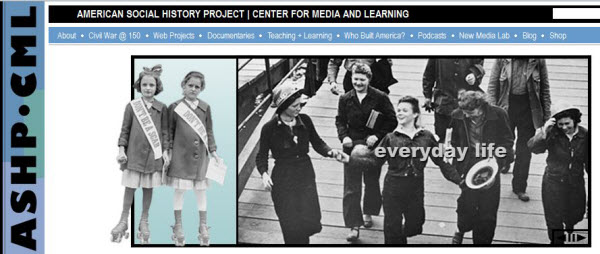 Based at the Graduate Center, The American Social History Project/Center for Media and Learning “produces print, visual, and multimedia materials that explore the richly diverse social and cultural history of the United States.” It conducts seminars and professional training session for teachers which introduce the “latest scholarship, technology, and active learning methods” available for use in classrooms.
Based at the Graduate Center, The American Social History Project/Center for Media and Learning “produces print, visual, and multimedia materials that explore the richly diverse social and cultural history of the United States.” It conducts seminars and professional training session for teachers which introduce the “latest scholarship, technology, and active learning methods” available for use in classrooms.
Prof. Josh Brown is the Executive Director and Prof. Pennee Bender, the Associate Director/Multimedia Producer of the digital collection, and help coordinate student and faculty digital projects and research at the New Media Lab.
It’s a place to investigate, full of surprising discoveries. And it’s not just one story; good history involves the telling of many stories: often conflicting, sometimes troubling, and frequently inspiring. For more than twenty-five years, we’ve written books, produced documentaries, created digital and online programming, and organized activities that challenge the traditional ways people learn history. Informed by the latest scholarship, we make the past, and the lives of the working people and “ordinary” Americans who shaped it, vivid and meaningful.
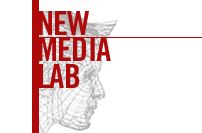 Under the direction of Andrea Vasquez, the New Media Lab works with Graduate Center and CUNY faculty and doctoral students from a variety of academic disciplines to conceive and create groundbreaking multimedia projects based on student and faculty scholarly research. With ongoing support from CUNY, the New Media Lab has become a dynamic environment in which projects funded by the National Endowment for the Humanities, the Rockefeller Foundation, and other private and public sources demonstrate new approaches and methods of merging digital media, scholarship, and learning. Run under the auspices of the Center for Media and Learning / American Social History Project, NML researchers: work across academic disciplines to produce scholarly digital media projects; analyze Internet and other digital media usage in the educational, social, and commercial sectors; construct interactive environments that explore ways of visualizing the arts, humanities, and sciences; digitally archive and analyze a wide range of data; participate in public programs that address the critical intersection of knowledge and technology.
Under the direction of Andrea Vasquez, the New Media Lab works with Graduate Center and CUNY faculty and doctoral students from a variety of academic disciplines to conceive and create groundbreaking multimedia projects based on student and faculty scholarly research. With ongoing support from CUNY, the New Media Lab has become a dynamic environment in which projects funded by the National Endowment for the Humanities, the Rockefeller Foundation, and other private and public sources demonstrate new approaches and methods of merging digital media, scholarship, and learning. Run under the auspices of the Center for Media and Learning / American Social History Project, NML researchers: work across academic disciplines to produce scholarly digital media projects; analyze Internet and other digital media usage in the educational, social, and commercial sectors; construct interactive environments that explore ways of visualizing the arts, humanities, and sciences; digitally archive and analyze a wide range of data; participate in public programs that address the critical intersection of knowledge and technology.



One comment
Comments are closed.